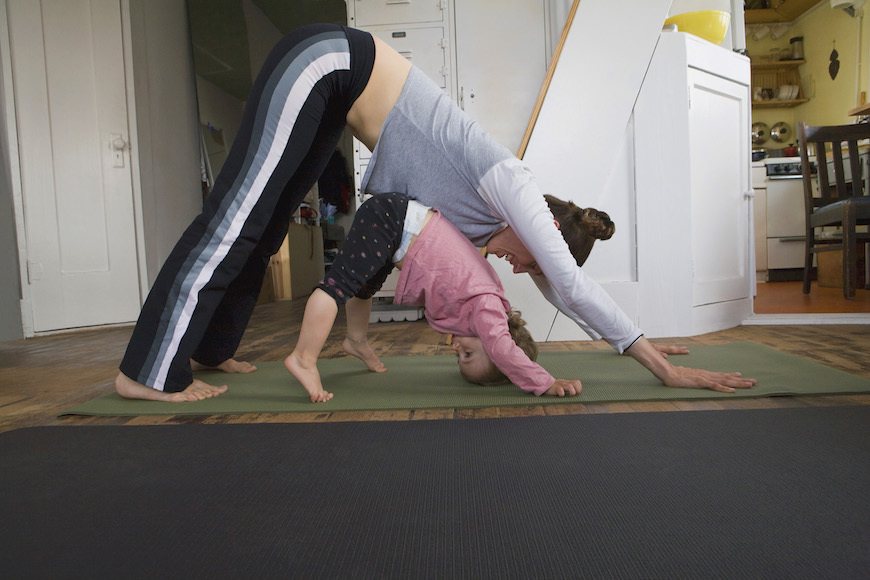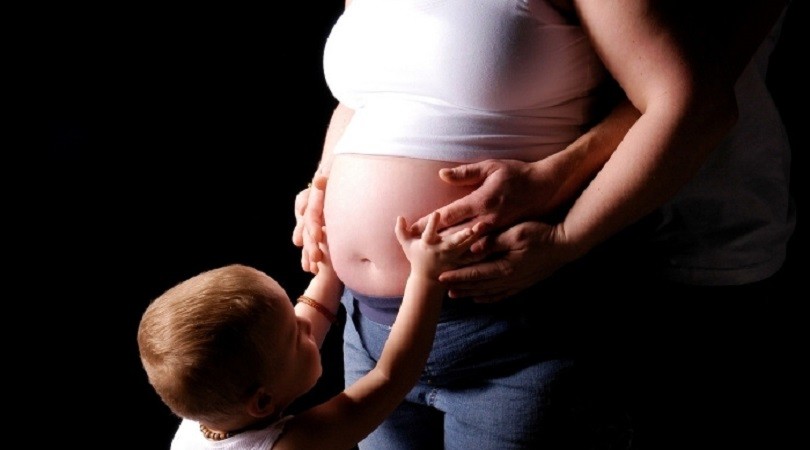Last Updated on January 6, 2025
Yes, certain signs in children can suggest a possible pregnancy in a woman. Children often have an innate ability to pick up on changes in their environment, including physiological changes in their mothers.
Although not scientifically proven, anecdotal evidence suggests that some children may exhibit behaviors or make comments that hint at a possible pregnancy in their mother. These signs can vary widely, from an increased interest in pregnancy-related topics to a heightened sense of intuition.
While it is important to approach such indicators with caution and consult a healthcare professional for a definitive pregnancy test, it can be intriguing to observe the ways in which children may seemingly predict this life-altering event. Understanding these potential signs can help parents better prepare for the arrival of a new addition to the family.

Credit: www.wellandgood.com
Related: Can Pregnant Women Drink Ensure?
Signs And Signals
Observing Changes In A Pregnant Woman’S Body
- A pregnant woman undergoes several physical changes during pregnancy, some of which may be observable by a child. Here are some key signs to look out for:
- Growing belly: The most apparent visual change is the woman’s expanding abdomen as the baby grows.
- Weight gain: Pregnant women typically gain weight throughout their pregnancy, which can be noticeable to a child.
- Breast changes: The breasts may become larger, more sensitive, or develop darkened areolas.
- Skin changes: Some pregnant women experience changes in their skin, such as stretch marks, darkening of the skin, or the appearance of a pregnancy mask.
- Changes in posture: As the pregnancy progresses, a woman’s center of gravity shifts, causing changes in her posture and gait.
Heightened Senses And Intuition
- It is believed that children possess a natural ability to sense and intuit certain things, including pregnancy. Here are some ways in which a child’s heightened senses and intuition may come into play:
- Smell: Children may be more sensitive to changes in a pregnant woman’s body odor, which can be influenced by hormonal changes.
- Taste: A child may notice subtle changes in a pregnant woman’s taste preferences or cravings.
- Hearing: Some children may claim to hear sounds or voices coming from the mother’s belly, possibly due to the baby’s movements or heartbeat.
- Empathy: Children may exhibit heightened empathy towards a pregnant woman, being more attuned to her emotional state.
Related: Can Apple Cider Vinegar Cause Miscarriage In Early Pregnancy?
Behavioral Changes In A Child
- When a child senses that their mother is pregnant, they may display certain behavioral changes. Here are some common signs to watch for:
- Increased curiosity and attention: A child may show a heightened interest in the concept of pregnancy, asking questions and seeking to understand the changes happening.
- Protective instincts: Some children may naturally become more protective of their pregnant mother, perhaps showing concern for her well-being or offering to help with tasks.
- Bonding with the baby: As a child comprehends the concept of a new sibling, they may show excitement and begin forming a bond with the unborn baby, talking to the belly or even suggesting names.
- Change in behavior: Children may exhibit mood swings, become more clingy or distant, or experience a mix of emotions as they adjust to the upcoming changes in the family dynamic.
By paying attention to these signs and signals, it is possible for a child to predict pregnancy. Their observations of physical changes in a pregnant woman’s body, heightened senses and intuition, and behavioral changes can provide valuable insights and a sense of anticipation for the arrival of a new family member.
Scientific Explanations
Have you ever heard stories about children being able to predict a pregnancy? It may sound like something out of a movie, but there could be some scientific explanations behind this phenomenon. Let’s dive into the research on the connection between pregnancy hormones and scent, as well as the impact of hormonal changes on a pregnant woman’s body odor.
Additionally, we’ll explore studies on children’s ability to detect changes in body odor.
Research On The Connection Between Pregnancy Hormones And Scent
- During pregnancy, women experience significant hormonal fluctuations, which can lead to changes in their body chemistry.
- These hormonal changes can affect a woman’s scent, making her smell different to those around her.
- Research suggests that the odor changes associated with pregnancy may be related to hormonal signaling.
- Studies have shown that pregnant women emit specific chemical compounds that can be detected by others, including children.
- The presence of these compounds in a pregnant woman’s scent may serve as a biological cue for children to detect pregnancy.
Impact Of Hormonal Changes On A Pregnant Woman’S Body Odor
- Pregnancy hormones, such as human chorionic gonadotropin (hcg) and estrogen, can affect a woman’s body odor.
- Increased hcg levels, which are secreted by the placenta, have been linked to changes in a woman’s scent during pregnancy.
- Estrogen, another hormone that surges during pregnancy, can also influence body odor.
- These hormonal changes may result in heightened sensitivity to odors and altered scent perception in pregnant women.
- The changes in body odor can be subtle, but some individuals, especially children, may be more attuned to these differences.
Related: Can You Get Fired For Being Pregnant?
Studies On Children’S Ability To Detect Changes In Body Odor
- Several studies have explored the ability of children to detect changes in body odor associated with pregnancy.
- In a study published in the journal frontiers in psychology, researchers found that children as young as six years old were able to correctly identify pregnant women based on their scent.
- The study suggested that children possess an innate ability to detect changes in body odor, specifically when it comes to identifying pregnancy.
- Another study conducted at the university of wroclaw in poland found that children were able to distinguish between body odor samples of pregnant and non-pregnant women with a high level of accuracy.
- These findings indicate that children may have a heightened sense of smell and sensitivity to the changes in scent associated with pregnancy.
Scientific research suggests that there may indeed be a connection between pregnancy, hormones, and a woman’s body odor. Children, in particular, show a remarkable ability to detect these olfactory changes and predict pregnancy. While the exact mechanisms behind this phenomenon require further exploration, these studies shed light on the fascinating interplay between our biology and the perception of scent.
Emotional Bonds And Intuition
The Emotional Bond Between Mother And Child
The emotional bond between a mother and her child is a powerful and unique connection that begins long before birth. This bond is formed through various experiences and interactions, and it can be especially strong during the pregnancy period. Here are some key points about the emotional bond between mother and child:
- During pregnancy, a mother’s emotions can greatly affect the developing child. Research suggests that a mother’s stress, anxiety, and even happiness can influence the baby’s emotional well-being.
- The baby in the womb can perceive and respond to the mother’s emotions. This is because of the close physical and biochemical connection formed through the placenta. The mother’s emotions can impact the baby’s neurodevelopment and stress regulation.
- This emotional bond can also be nurtured through activities such as talking, singing, and gentle touch. Studies show that babies can recognize their mother’s voice and respond to it even before birth. These interactions help strengthen the emotional connection between mother and child.
- The emotional bond that starts during pregnancy continues to grow after birth. The physical presence of the mother, along with her care, love, and responsiveness, further deepens the bond. This bond provides a sense of security and support for the child’s emotional well-being.
How Intuition Plays A Role In A Child’S Prediction
Children often possess a remarkable sense of intuition that allows them to pick up on subtle cues and changes in their environment. When it comes to predicting pregnancy, this intuition can come into play. Here are some key points about how intuition plays a role in a child’s prediction:
- Children can easily perceive changes in their mother’s behavior and physical appearance. They may sense the excitement or anticipation surrounding a pregnancy, even before any formal announcement is made. This intuitive understanding can lead them to predict that their mother is expecting.
- Intuition is not limited to older children; even young toddlers can exhibit a sense of knowing when something is different. They may exhibit behaviors such as pointing at the mother’s belly or showing increased curiosity about pregnancy-related topics.
- It is believed that children tap into their intuition through a combination of observation, sensitivity, and an innate connection to their parents. They can pick up on subtle shifts in energy and emotions, leading them to predict significant life changes such as pregnancy.
- While intuition can play a role in a child’s prediction of pregnancy, it is important to note that it is not foolproof. Children’s perceptions can sometimes be influenced by external factors or misconceptions. Therefore, it is essential to consider various factors before drawing any conclusions based solely on a child’s intuitive responses.
Empathy And Sensitivity In Children
Empathy and sensitivity are essential qualities that many children possess. These traits allow them to understand and share the feelings of others, making them particularly attuned to changes in their loved ones’ lives. Here are some key points about empathy and sensitivity in children:
- Children often exhibit empathy towards their parents, especially their mothers during pregnancy. They may notice subtle signs such as changes in their mother’s mood or physical discomfort. This empathy can lead them to predict pregnancy as they sense their mother’s need for support and care.
- Sensitivity to emotional cues is another factor that can contribute to a child’s prediction of pregnancy. Children who are sensitive to their mother’s emotional state may pick up on her excitement or happiness, linking it to the idea of pregnancy.
- It is important to note that not all children may exhibit empathy and sensitivity in the same way. Each child is unique and may respond differently to changes in their environment. Some may be more attuned to their mother’s experiences, while others may require more direct communication to understand the concept of pregnancy.
- Parents can support and nurture empathy and sensitivity in their children by encouraging open communication, acknowledging and validating their feelings, and setting a positive example of empathy in their own interactions.
The emotional bond between a mother and child, along with a child’s intuition, empathy, and sensitivity, can collectively contribute to their prediction of pregnancy. It is a fascinating aspect of the parent-child relationship and highlights the remarkable connection that exists even before a baby is born.
Cultural Beliefs And Folklore
**can a child predict pregnancy? **
Are children capable of predicting pregnancy? This is a fascinating question that has intrigued cultures around the world for centuries. Cultural beliefs and folklore often attribute special abilities to children when it comes to predicting the arrival of a newborn.
Let’s explore some of the traditions, superstitions, and cultural perspectives surrounding this intriguing concept.
Traditions And Beliefs Surrounding Children Predicting Pregnancy
- Many cultures believe that certain behaviors or expressions displayed by children can indicate the presence of pregnancy. These traditions have been passed down through generations and are deeply ingrained in the folklore of various societies.
- Children are often perceived as having a heightened sense of intuition, which enables them to sense the changes that occur within a pregnant woman’s body. This belief is deeply entrenched in the cultural fabric of many communities.
Superstitions And Old Wives’ Tales
- Superstitions and old wives’ tales play a significant role in cultural beliefs surrounding pregnancy predictions. These beliefs have been passed down through generations and are still prevalent in many societies today.
- Certain physical characteristics or actions displayed by children are often considered indicative of a pregnant woman’s condition. These beliefs range from observing the shape of a child’s nose to noticing changes in their behavior when near a pregnant individual.
- Folklore suggests that certain signs, such as a child being unusually clingy or demonstrating a stronger interest in a particular person’s belly, can indicate the presence of pregnancy.
Cultural Perspectives On The Special Abilities Of Children
- Across cultures, children are considered to possess a certain level of sensitivity and intuition that makes them more attuned to the presence of pregnancy. This perceived ability is often viewed as a natural gift or a special connection to the spiritual realm.
- In some cultures, children are believed to have a direct line of communication with the unborn child. This connection allows them to sense the presence of a new life and predict the onset of pregnancy.
- Cultural practices encourage pregnant women to pay attention to the behavior and reactions of children around them, as they may hold valuable insights into the pregnancy.
Bearing witness to a child predicting pregnancy offers a glimpse into the mysterious world of cultural beliefs and folklore. While there are no scientific explanations for these phenomena, the traditions and superstitions surrounding children’s abilities continue to captivate our imagination.
Regardless of whether these predictions hold any truth, they contribute to the rich tapestry of cultural heritage and the diverse ways in which different societies perceive and celebrate the miracle of life.
Frequently Asked Questions Of Can A Child Predict Pregnancy?
Can A Child Predict Pregnancy?
Yes, children can often sense pregnancy due to increased emotions and physical changes in the expectant mother.
How Do Children Exhibit Signs Of Pregnancy Prediction?
Children may display signs such as increased curiosity, attachment to the pregnant mother, or even verbalizing their prediction.
What Are Some Examples Of Children Predicting Pregnancy?
Examples include a child guessing the baby’s gender correctly, insisting on being near the pregnant person, or showing excitement before any public announcement.
Why Are Children Often Accurate In Predicting Pregnancy?
Children have intuitive abilities and are observant of subtle changes, hormone shifts, and behavioral patterns that indicate pregnancy.
Should Parents Rely On A Child’S Prediction Of Pregnancy?
While interesting, a child’s prediction should not replace medical tests, but rather be seen as an additional insight into the family dynamics and possible pregnancy.
Conclusion
To sum up, while some may believe in the folklore surrounding a child’s ability to predict pregnancy, there is no scientific evidence to support this claim. It is important to remember that pregnancy is a complex process that involves various physical and hormonal changes which cannot be accurately perceived by a child’s intuition alone.
While it is interesting to hear stories of children exhibiting supposedly uncanny abilities, it is more likely that these instances are coincidences or the result of children picking up on subtle cues from their parents or changes in their environment.
Instead of relying on such anecdotal evidence, it is always best to consult medical professionals and reliable pregnancy tests for confirmation. Ultimately, the joy of welcoming a new life into the world should be cherished without placing too much emphasis on old wives’ tales and superstition.











